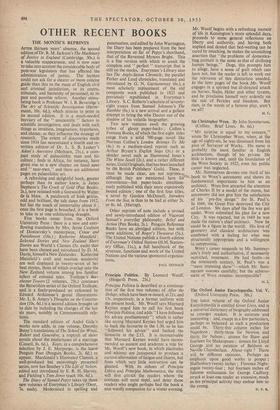OTHER RECENT BOOKS
THE MONTH'S REPRINTS Amu thirteen years' absence, the second edition of Dr. R. M. Jackson's The Machinery of Justice in England (Cambridge, 30s.) is a valuable reappearance, and is now reset to take into account the considerable body of post-war legislation that has affected the administration of justice. The layman could not ask for a clearer or more concise guide than this to the maze of English civil and criminal jurisdiction, to its courts, tribunals, and hierarchy of personnel, to its past and possible reform. Another stimu- lating book is Professor W. I. B. Beveridge's The Art of Scientific Investigation (Heine- mann, 10s. 6d.), which returns to print in its second edition. It is a much-needed breviary of the " unscientific " factors in scientific investigation, and deals with such things as intuition, imagination, hypothesis, and chance, as they influence the strategy of research. The extent of discoveries made since 1934 has necessitated a fourth and re- written edition" of Dr. L. S. B. Leakey's Adam's Ancestors (Methuen, 21s.), a com- pact study of palaeolithic man and his culture ; finds in Africa, for instance, have given rise to a new chapter on fossil apes and " near-men," and there are additional pages on palaeolithic art.
A refreshing and delightful book, greater perhaps than its author knew, is James Stephens's The Crock of Gold (Pan Books, 2s.), now reissued with a foreword by Walter de la Mare. A patchwork of Irish genius, odd and brilliant, the tale dates from 1912, but has the touch of immortality about it ; once the first page is broached, it is a book to take in at one exhilarating draught.
Five books come from the Oxford University Press : there is a new and easy- flowing translation by Mrs. Jessie Coulson of Dostoevsky's masterpiece, Crime and Punishment (16s.) ; Katherine Mansfield : Selected Stories and New Zealand Short Stories are World's Classics (5s. each) that have been chosen and introduced by D. Mr Davin, himself a New Zealander. Katherine Mansfield's craft and resolute sensitivity are well displayed in twenty-seven of her best stories, three of which overlap into the New Zealand volume among less familiar tellers of colonial tales. Trollope's Bar- chester Towers (2 volumes, 25s.) continues the Barsetshire series of the Oxford Trollope, and is a finely-produced set enlivened by Edward Ardizzone's genial illustrations. Mr. L. S. Amery's Thoughts on the Constitu- tion (10s. 61:1.) is a second edition brought up to date by including the changes of the last six years, notably in Commonwealth rela- tions.
The standard edition of Andre Gide's works now adds, in one volume, Dorothy Bussy's translations of The School for Wives, Robert and Genevigve, a triptych of short novels about the misfortunes of a marriage (Cassell, 8s. 6d.). Keats, in a comprehensive Selection by J. E. Morpurgo, is the latest Penguin Poet (Penguin Books, 2s. 6d.) to appear. Macdonald's Illustrated Classics, a well-produced but uninvitingly , presented series, now has Southey's The Life of Nelson, edited and introduced by E. R. H. Harvey, and Fielding's Tom Jones (each 10s. 6d.).
The Diary of Samuel Pepys takes up three new volumes of Everyman's Library (Dent, 7s. each). Modernised in spelling and punctuation, and edited by John Warrington, the Diary has been prepared from the best interpretation so far of Pepys's shorthand, that of the Reverend Mynors Bright. This is a fine version with which to await the complete and " perfect " transcript that is still on the stocks. Everyman's Library also has The Anglo-Saxon Chronicle, the parallel Parker and Laud chronicles, translated and introduced by G. N. Garmonsway (6s.), a most scholarly replacement of the old composite work published in 1823 and previously • republished in Everyman's Library. S. C. Roberts's selection of seventy- eight essays from Samuel Johnson's The Rambler (6s.) is a new-arrival and a gallant attempt to bring the wise Doctor out of the shadow of his volatile biographer.
Two new ventures swell the growing tribes of glossy paper-backs ; Collins's Fontana Books, of which the first eight titles range from a solid 700-page novel like Norman Collins's London Belongs To Me (4s.) to a medium-sized reprint such as Arthur Bryant's English Saga (3s.) or a slender novel such as Hammond Innes's The White South (2s.), and a rather different series, Guild Originals, that has been launched by tit British Publishers' Guild. These, it must be made clear, are not reprints— although they are mentioned here for'' convenience—but paper-backs simultane- ously published with their more expensively bound edition ; one of the first four titles, a novel by Gordon McDonell, Intruders From the Sea, is thus to be had at either 2s. or 8s. 6d. (Harrap).
Other reprints of note include a revised and newly-introduced edition of Viscount Samuel's everyday philosophy, Belief and Action (Pan Books, 2s.). Penguin Reference Books have an abridged edition, but with some additions, of Roget's Thesaurus (5s.). The United Nations publish a fourth edition ofEveryman's United Nations (H.M. Station- ery Office, I is.), a full handbook of the structure, functions-and work of the United Nations and the various sponsored organisa- tions.
PAUL DINNAGE


































 Previous page
Previous page